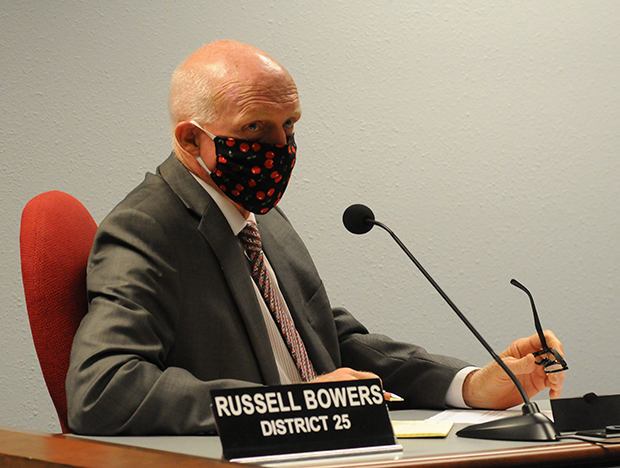Former IRC commissioner says successors erred on competitiveness
Jeremy Duda//October 27, 2011//[read_meter]
Former IRC commissioner says successors erred on competitiveness
Jeremy Duda//October 27, 2011//[read_meter]
James Huntwork, a Republican who served on the original Arizona Independent Redistricting Commission, said his successors are not properly drawing legislative and congressional maps based on constitutional criteria.
In testimony on Wednesday to the Joint Legislative Committee on Redistricting, Huntwork said the current IRC is improperly using competitiveness to draw the maps in a “headlong quest” to create more competitive districts. He cited a provision in the Arizona Constitution that says voter registration and voting history data “shall be excluded from the initial phase of the mapping process,” except to test their maps for compliance with the other five criteria.
“That’s a failure and I think it’s a fundamental failure,” he said.
Huntwork, who was appointed to the IRC by Rep. Jim Weiers, a co-chair of the committee, said commissioners cannot go into the process with a fixed idea of the number of competitive districts they want to see, or use competitiveness as a motivating factor for districts without factoring in other criteria.
He also said that if the IRC does not create an initial set of maps that excludes competitiveness, it would have no way of knowing whether competitiveness conflicted with the other criteria. The Arizona Constitution says the commission shall create competitive districts when it would not create a “significant detriment” to the other requirements.
“The only correct number of competitive districts is the number that emerges naturally when the commission honestly and diligently follows the process and the rules that are laid out in Proposition 106,” Huntwork said, referring to the 2000 ballot measure that created the IRC. “How could the commission determine that a change we were making to favor competitiveness created no significant detriment unless we created a map that embodied the other goals to compare it to?”
Huntwork said the Voting Rights Act is a major obstacle in creating competitive districts. He noted that when the first IRC began its work, voter registration in Arizona was fairly even between Democrats, Republicans and independents, with a slight edge for the GOP. But after they created nine majority-minority districts mandated by the Voting Rights Act – which skew heavily toward Democrats – the remainder of the state was about 42 percent Republican and 26 percent Democratic.
He also objected the way the IRC chose its attorneys, with independent Chairwoman Colleen Mathis voting with the two commission’s two Democrats over the objections of the Republican commissioners. The commission set out to hire a Democratic attorney and a Republican attorney, but rejected the Republicans’ choice in favor of another candidate and then hired a Democratic attorney who wasn’t the first choice of the Democratic commissioners.
“If you’re going to hire a Democrat lawyer and a Republican lawyer, you need to hire a Republican lawyer who the Republican commissioners actually trust and are happy with, and a Democrat lawyer who the Democrats are (happy with),” he said. “To hire a Republican lawyer who isn’t picked by the Republicans is nonsense. It’s just mindbogglingly illogical.”
If the commission doesn’t abide by the guidelines laid out in the constitution, Huntwork said, it risks undermining the “idealistic experiment” created by Proposition 106. He said he supported the commission on principle, though he opposed some of its actions.
Related:
- Republican leaders blast IRC over congressional maps
- Redistricting committee may not make concrete recommendations to IRC
- Dems fire back at GOP criticisms of IRC by filing records request with Horne’s office
- Horne asks court to order IRC’s cooperation with probe
- Seel suggests mapping firm retaliated for his bills

















